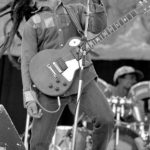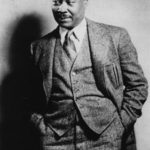By Eron Henry
Famous Jamaicans Bob Marley, Marcus Garvey and Claude McKay were all of African-Irish descent
Next to persons of African descent, the largest racial/ethnic group in Jamaica are of Irish ancestry. This is a surprise as many Jamaicans thought the next largest group to be East Indians.
It is doubtful most Jamaicans are of a single race or ethnicity, what with the racial mixing since European arrival in the late 15th century. Unlike other countries, such as the United States, Jamaica does not pay keen attention to such things. One is not asked one’s race or ethnicity on official documents. One is Jamaican or isn’t.
My maternal grandmother, who was born in the 1880s and died in the 1990s, said her grandfather was a “Scotsman,” a term that can refer to a white Jamaican regardless of ethnicity. Granny and all her children, including my mother, were light skinned, so her assertion adds up. Whether my great-great-grandfather was English, Irish or actually a Scot, is not really known.
Irish slaves
A little-known fact is that Irish slaves were brought to the Caribbean by the British. This according to Herbert Byrd Jr. in his book, Proclamation 1625: America’s Enslavement of the Irish. Oliver Cromwell, who overthrew the British king Charles I, “placed tens of thousands of Irish in slavery and transported some to the mainland (North America) plantations; others were shipped to plantations in the West Indies.”
Enslaved Irish were part of the force that wrested Jamaica from Spain in 1655. Byrd said the expedition “included many Irish slaves” from Barbados and St. Kitts (St. Christopher at the time). After the British took full control of Jamaica, “Cromwell, with his new island, had Irish slaves sent from Barbados and St. Christopher to work the new land.”
Others were brought directly from Ireland. As early as 1656, Cromwell ordered that 2,000 Irish children be taken to Jamaica and sold as slaves to English settlers. In The Irish Abroad, Elliott O’Donnell said “that 6,000 boys and girls were transported as slaves from Ireland to Jamaica, and that the total number transported there and to Virginia amounted to 10,000.”
According to Byrd, English “slave owners bred the African males with the Irish women and girls” in the North American colonies. African-Irish enslaved persons, it is alleged, fetched a higher sale price than those who were purely African or Irish.
Ray Cavanaugh claimed this was practiced in Jamaica for a similar, but slightly different reason. “Rather than spending money on new slaves, the Jamaican plantation owners began mating Irish females with African men to create a new breed of slave that, in the Caribbean climate, was a more apt labourer, and thus commanded a higher value than full-blooded ‘Irish livestock’” (Sláinte Mon – The Irish of Jamaica).
Jamaica-Irish solidarity
English oppression of the Irish gave rise to feelings of affinity between Irish and black Jamaicans. Irishman Richard Robert Madden, “who left his profitable career as a doctor in London…was appointed a Special Magistrate in Jamaica where he oversaw the abolition of slavery in 1834,” wrote librarian and historian, Liam Hogan. “He was hated by the planters there (now former slaveowners) as he doggedly defended the emancipated slaves new rights by making site inspections and ensuring that they were treated as equals in his court. After much intimidation, threats and eventually a violent assault in the street, he had to resign his position.”
Madden discovered he had black enslaved relatives in Jamaica. Close family resemblances of black Jamaicans with his Irish family confirmed their common ancestral heritage. “Undoubtedly, the unforeseen encounter with his Jamaican relatives had a profound impact on Madden, infusing him with an even greater desire to eradicate slavery in all its forms,” said Hogan.
The Madden name is well known in Jamaica. A branch of the family owns one of the oldest and largest funeral businesses on the island.
It is believed Marcus Mosiah Garvey, who founded the Universal Negro Improvement Association in August 1914, had Irish ancestry. The Irish Rising of 1916 appeared to have a profound impact on and influenced the Jamaican National Hero.
The Rising on Easter in April 1916 is a pivotal event in Irish history. It led to partition and the creation of the independent Republic of Ireland. The rest of the island became Northern Island, a colony of Britain, which has had a long struggle for independence from Britain and reunification with the Irish republic.
In Black and Green: The Fight for Civil Rights in Northern Ireland & Black America, Brian Dooley said “Garvey was one of several black nationalists who studied and admired the Irish Republican approach. Garvey’s Irish influences had begun as early as 1910, when he was assistant secretary of the National Club of Jamaica, whose founder, S.A.G. Cox, had admired the Sinn Fein movement while studying in the early years of the century.”
Dooley contended that “Garvey based many of his black nationalist ideas on the Irish model.” Noted Garvey scholar Robert Hill said as much in The Marcus Garvey and Universal Negro Improvement Association Papers. “Far more than any other nationalist struggle, the Irish revolutionary struggle assisted in focusing Garvey’s political perspective.” Hill indicated that “even the slogan made famous by Garvey, ‘Africa for the Africans at home and abroad,’ echoed the oft-repeated Irish slogan, ‘the Irish race at home and abroad.’”
Irish influences
Irish last names are common in Jamaica – Burke, Clarke, Collins, Lynch, Murphy, Walsh. Any name with the prefixes “Mc” – McKenzie, McDonald, McCall, McMorris, McMillan, etc.; and “O’” – O’Brien, O’Connor, O’Hara, O’Meally, etc.
Another famous Jamaican of Irish extract is Bob Marley, who had a white father and black mother, both Jamaicans. Jamaica’s first prime minister, Alexander Bustamante, who changed his last name from Clarke, was of Irish ancestry. So was the island’s most famous poet of the early 20th century, Claude McKay, a leader of the Harlem Renaissance in New York in the 1920s.
Strong Irish influence is evident in place names. Irish Town and Dublin Castle in St. Andrew; Irish Pen and Sligoville in St. Catherine; Athenry and Bangor Ridge in Portland; Clonmel and Kildare in St. Mary; Belfast and Middleton in St. Thomas; and Ulster Spring in Trelawny.
The Jamaica Constabulary Force, formed in 1866, is believed to have been modeled off the Irish police force, including the “red seam” that runs down the side of the trousers.
Persons with a keen ear claim there are similarities between the accent of Jamaican and other Caribbean citizens, and the Irish. As one Irish noted, “Jamaicans always sound like they’re from Cork to me!” Cork is a university city in southwest Ireland. The United Kingdom comedian and actor, Lenny Henry, whose parents were born in Jamaica, described Ireland as “Jamaica in the cold.”
There is strong suggestion that the Irish gave Jamaicans their highly colorful, and beloved, curse words, those of the various “cloth” varieties. If true, it is an enduring legacy bequeathed by the Emerald Isle. The Irish, it appears, taught Jamaicans to curse in a manner no others can.
Eron Henry is author of Constitutionally Religious: What the Constitutions of 180 Countries Say About Religion and Belief and the novel, Reverend Mother.



I go to Treasure Beach, Jamica, very often, and know that many of those who live there are also of Scottish descent. What a great post. I’m going to pass it on to my husband. Jamaica is one of our favorite places.
Awesome. Thanks for this information. This gives me much reason to investigate Treasure Beach. I plan on doing a piece on the Germans in Seaford Town in Westmoreland and elsewhere. I’ve already written a piece on the Jews in Jamaica that I’ve yet to publish. Perhaps December or next year. Again, thanks.
We heard/read it was the result of a shipwreck and the sailors were stranded in Treasure Beach for years.
Cromwell sent thousands of irish catholics to the west indies around 1650 mostly as slaves, some indentured, all young Irish to work on the sugar plantations, look it up, you tube have a documentary on this
Indentured labour is where one is paid in advance for several years to come. This system was not developed for years later. With his record the prospect of paying the conquered in advance is not on
These were war booty an sold as slaves.
I started out reading up on silk cotton trees in Jamaica and came across this article. I was totally engulf. I am a white Russell from the Bahamas. I’ve always been told I am of Irish descent. After reading your piece I’m even more curious now if I came from Irish slaves. Once again. Excellent reading.
If selective breeding of humans was occurring, perhaps athleticism and foot speed were traits promoted in the breeding programs….. cuz the best sprinters in the World are not from the continent of Africa, they are from the relatively tiny population center of Jamaica. When you see specimens like Canadian Ben Johnson of 1988 Olympic infamy or the NBA’s Tim Duncan from Barbados, it’s not folly to speculate hat some of those genes were selected by breeders. Disclaimer. I am not a supporter of slavery ever and believe forced human breeding is immoral. But lots of history is ugly and it’s important to not be afraid of facts from those sordid sources.
My parents were born in St Lucia and I and my brothers in London. My DNA test revealed that my father line goes back to Celtic Ireland, which was a surprise and revelation. I knew my mothers side are of mullato mix, the way they talk about their grandfather as if his whiteness makes him all good and true, wrong. [Lot of self hate] Being of St Lucian heritage I have a French family name, TOussaint and was half expecting to have French blood not Irish. The english took slaves workers/slaves from Barbados to St Lucia rather than directly from Africa initially . I kinda figured that was where the irish connection came from… Maybe.
My mothers’ grand father on one side was a Burke. We are from Middleton District, St Thomas. My mother has often told me that the Burke’s were brothers who survived a shipwreck and settled among the African Jamaicans.